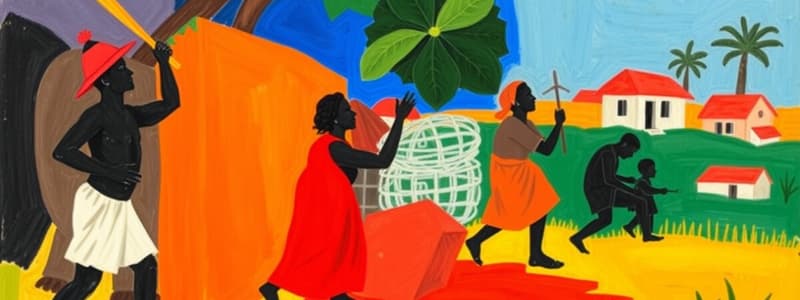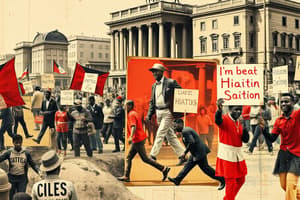Podcast
Questions and Answers
What years did the Haitian Revolution take place?
What years did the Haitian Revolution take place?
- 1804-1815
- 1791-1815
- 1789-1804
- 1791-1804 (correct)
What was Haiti known as due to its natural wealth?
What was Haiti known as due to its natural wealth?
Pearl of the Antilles
Haiti was a colony of Spain.
Haiti was a colony of Spain.
False (B)
What economic policy restricted trade to the Mother country?
What economic policy restricted trade to the Mother country?
What were the main crops produced in Haiti?
What were the main crops produced in Haiti?
What societal divisions existed in Haiti?
What societal divisions existed in Haiti?
What events preceded the Haitian Revolution?
What events preceded the Haitian Revolution?
What was a desire of the enslaved that contributed to the revolution?
What was a desire of the enslaved that contributed to the revolution?
What type of conditions were the enslaved subjected to?
What type of conditions were the enslaved subjected to?
What kind of punishments were inflicted on enslaved individuals?
What kind of punishments were inflicted on enslaved individuals?
Why did enslaved individuals resent their situation?
Why did enslaved individuals resent their situation?
How was Haitian society described during the revolution?
How was Haitian society described during the revolution?
Who was a great strategist in the Haitian Revolution?
Who was a great strategist in the Haitian Revolution?
What religious practice was significant in the Haitian Revolution?
What religious practice was significant in the Haitian Revolution?
Flashcards are hidden until you start studying
Study Notes
Haitian Revolution
- Occurred from 1791 to 1804, leading to Haiti becoming the first black republic to gain independence on January 1, 1804.
- Known as the 'Pearl of the Antilles' due to its rich natural resources like gold, pearls, and fertile land.
Colonization
- Haiti was a colony of France, which established economic structures that favored French interests.
Mercantilism
- Economic policy where Haitian colonies were restricted to trading exclusively with France, limiting their economic freedom.
Agriculture
- Main agricultural products included coffee and sugar, with Haiti recognized as a leading producer in these commodities.
Society Structure
- Social hierarchy divided by color and wealth:
- Grand Blancs: wealthy whites.
- Petit Blancs: poor whites.
- Gens de couleurs: mixed-race population.
- Free Blacks/Maroons: freed individuals.
- Enslaved Africans: the majority of the population.
Pre-Revolution Conditions
- Tensions escalated prior to the revolution due to revolts from poor whites and uprisings by the colored population.
Causes of the Revolution
- Strong desire for freedom spurred the enslaved population to seek liberation from bondage and live independently.
Harsh Conditions of Enslavement
- Enslaved individuals faced daily horrors, creating an environment ripe for rebellion.
Punishments for Enslaved People
- Severe punishments included whipping, use of the treadmill, and neckbars, with women subjected to special restraints that prevented them from speaking.
Resentment of Enslaved People
- Majority of the enslaved population were born in Africa, enduring extremely harsh conditions that led to a life expectancy of roughly 25 years.
Fragmented Society Dynamics
- The divided society enabled whites and mulattoes to revolt, offering an opportunity for the enslaved to join in the fight against their oppressors.
Leadership during the Revolution
- Boukman Dutty ignited the revolution with a Vodoo ceremony.
- Toussaint L'Ouverture emerged as a skilled strategist, organizing the enslaved populace into a formidable force against French, British, Spanish, and American interests.
- Jean Jacques Dessalines executed numerous whites, contributing to a demographic shift.
- Henri Christophe, experienced from his time in the American Revolution, utilized his military skills in Haiti.
African Religious Influence
- Voodoo played a crucial role; the revolution commenced with a ceremony where warriors received talismans and spells, fostering a sense of invincibility and unity among the fighters.
Studying That Suits You
Use AI to generate personalized quizzes and flashcards to suit your learning preferences.




